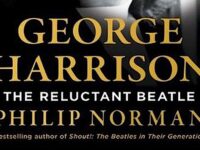Ravi Shankar became both a musical and spiritual influence on George Harrison, as the two forged a deeply personal relationship that still lingers with the sitar master: “He was so sincerely in love with India and the Indian religion,” Shankar says, “because he was more into the philosophical aspect of the old system. This plus music, we became such good friends. He became like part of me. … I miss him very much.”
The late former Beatle first dabbled with the sitar on “Norwegian Wood (This Bird Has Flown),” from the 1965 Fab Four album Rubber Soul, thought to be the first instance of the instrument in a Western pop song. Later, in June of 1966, he began studying under Shankar. At one point, Harrison was living in a houseboat near the Himalayas, while undertaking six weeks of intense instruction.
Harrison subsequently made prominent use of the sitar in a series of Beatles songs, including “Love You To” and “Tomorrow Never Knows” from 1966’s Revolver, “Within You Without You” from Sgt. Pepper, on “The Inner Light,” the 1968 B-side to the “Lady Madonna” single; and “Across the Universe,” which appeared on 1970’s Let It Be. Harrison’s first solo album, 1968’s Wonderwall Music, also featured the instrument.
“We became very, very dear to each other in the sense that it started with my teaching him sitar,” Shankar said told The L.A. Times. “And then gradually I saw his interest in Indian religion and more than religion, actually, philosophy and the old culture. And I helped him get many books to read, and that’s how it started.”
Along the way, Harrison was also instrumental in bringing Shankar himself to a broader Western audience. The former Beatle lobbied to have Shankar included on the bill at 1967’s Monterey Pop Festival, included the sitar player in the first major charity concert at 1971’s Concert for Bangladesh, recording Shankar Family and Friends in 1973 and then toured North America with Shankar the following year.
Harrison later included the sitar in the humorous Beatles tribute song “When We Was Fab,” from 1987’s Cloud Nine. He passed away after a bout with cancer in 2001.
Here’s a look back at recent thoughts on George Harrison. Click through the titles for complete reviews …
SOMETHING ELSE! FEATURED ARTIST: GEORGE HARRISON: George Harrison remains the Beatles’ great unresolved mystery — the guy who might have actually done more had he been in any another band after 1965. Or not. His solo records are a frustrating mix of the sublime, the blatant and the unremarkable. Sometimes within a three-song sweep. Sometimes within the same song. Thus, the unresolved part. George seemed as at odds as any world-famous person ever was with that very fame. He often only made records — in particular, in the days after his association with the outsized, and more than occasionally overbearing, talents of John and Paul — when he was made to, and it showed. No surprise, then, that it’s difficult to achieve a vista after 1970. All Things Must Pass could be a bloated, if admirable, mess. The mid-1970s were, at best, hit and miss. The 1980s were worse. That’s where we come in. Something Else! Reviews goes through the stacks to provide a definitive list of must-have tunes.
GEORGE HARRISON – LET IT ROLL (2009): There’s something in the way that Let It Roll, compiled with a loving and almost magical rhythm by Harrison’s family, moves through his catalog. Rather than yielding to familiar chronology, “Let It Roll” mixes and matches from across Harrison’s history. All of a sudden, essential complexities can be explored again, old scores can be settled, the familiar is seen differently. Let It Roll goes from “All Things Must Pass,” which works nearly 40 years later as a delicately spiritual memorial to the fallen Harrison, directly into the jaunty put-down song “Any Road” from his posthumous 2002 release Brainwashed — only to reverse course back to the Utopian “This Is Love” from his ’87 comeback album Cloud Nine. We begin to hear all of this with new ears.
DEEP CUTS: GEORGE HARRISON, “RISING SUN” (2002): This started as a fine little acoustic number. But like all of Harrison’s signature stuff, which is always somehow both downbeat and uplifting, it required a larger sound. That’s why Harrison was attracted, in his first solo incarnation, to Phil Spector — who couldn’t fathom a record without a few thousand violins playing along. And it’s why Jeff Lynne, playing posthumous svengali, wasn’t going to let this one be. Using Harrison’s initial and insistent guitar-strum beat as a platform, Lynne’s production explores both the ghost of regret and the atmospheric vistas that mark the best of Harrison’s — and, yeah, Lynne’s — work.
GIMME FIVE: SONGS WHERE THE BEATLES, WELL, SUCKED: There is much about the Beatles that’s easy to love. The ornate pop, the long-haired peaceability, the arguments over which one’s your favorite. Still, lend them your ear and you’ll discover a few duds. Even a group as talented, and successful, as the Fab Four couldn’t help but round out a handful of albums with what could only charitably be called filler. Heck, they even had a few charttoppers that qualify. (Yes, we’re looking at you “Hello, Goodbye.”) We dug into the stuff that didn’t quite make their hall-of-fame resume — the ones where they took a bad song … and made it worse.
[amazon_enhanced asin=”B000002UAO” container=”” container_class=”” price=”All” background_color=”FFFFFF” link_color=”000000″ text_color=”0000FF” /] [amazon_enhanced asin=”B000002UCN” container=”” container_class=”” price=”All” background_color=”FFFFFF” link_color=”000000″ text_color=”0000FF” /] [amazon_enhanced asin=”B00329UXJE” container=”” container_class=”” price=”All” background_color=”FFFFFF” link_color=”000000″ text_color=”0000FF” /] [amazon_enhanced asin=”B000BF0D88″ container=”” container_class=”” price=”All” background_color=”FFFFFF” link_color=”000000″ text_color=”0000FF” /] [amazon_enhanced asin=”B0025KVLTC” container=”” container_class=”” price=”All” background_color=”FFFFFF” link_color=”000000″ text_color=”0000FF” /]



